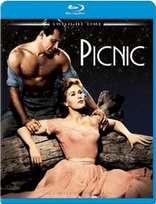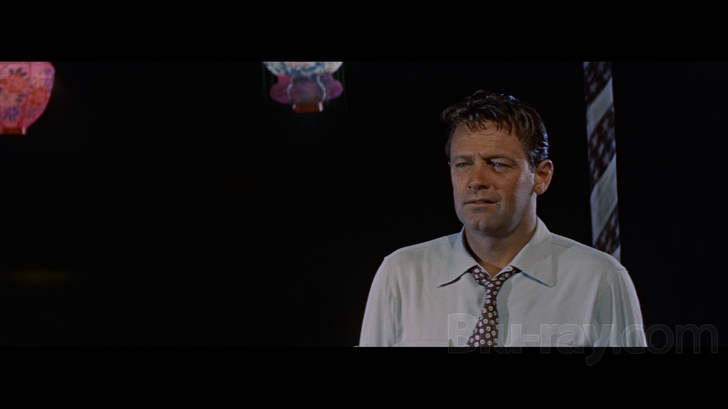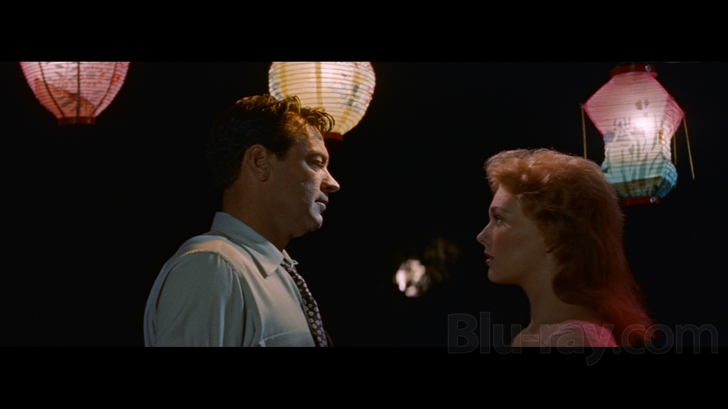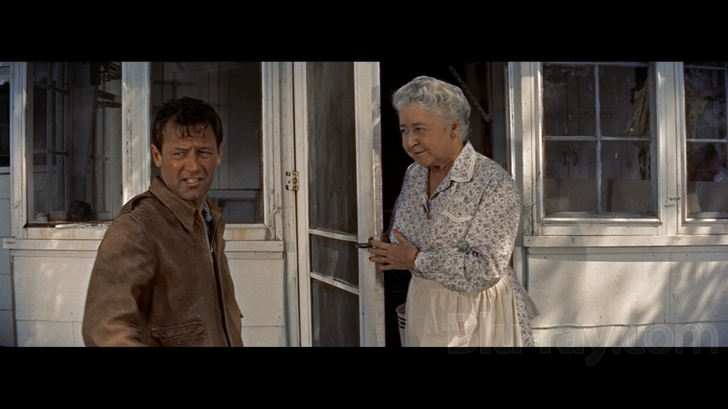Picnic Blu-ray Movie
HomePicnic Blu-ray Movie 
Limited Edition to 3000 - SOLD OUTTwilight Time | 1955 | 115 min | Rated PG | Jan 17, 2012

Movie rating
7.3 | / 10 |
Blu-ray rating
| Users | 3.9 | |
| Reviewer | 4.0 | |
| Overall | 3.9 |
Overview
Picnic (1955)
The morning of a small town Labor Day picnic, a drifter blows into town to visit an old fraternity buddy who also happens to be the son of the richest man in town. Hal is an egocentric braggart - all potential and no accomplishment. He meets up with Madge Owens, the town beauty queen and girlfriend of Alan Benson.
Starring: William Holden, Kim Novak, Betty Field, Susan Strasberg, Cliff RobertsonDirector: Joshua Logan
| Romance | Uncertain |
| Drama | Uncertain |
Specifications
Video
Video codec: MPEG-4 AVC
Video resolution: 1080p
Aspect ratio: 2.55:1
Original aspect ratio: 2.55:1
Audio
English: DTS-HD Master Audio 5.1 (48kHz, 24-bit)
English: DTS-HD Master Audio 2.0 (48kHz, 24-bit)
Music: DTS-HD Master Audio 2.0 (48kHz, 24-bit)
Subtitles
English SDH
Discs
50GB Blu-ray Disc
Single disc (1 BD)
Playback
Region free
Review
Rating summary
| Movie | 3.5 | |
| Video | 4.5 | |
| Audio | 4.5 | |
| Extras | 2.5 | |
| Overall | 4.0 |
Picnic Blu-ray Movie Review
And the best part is, there aren't any ants.
Reviewed by Jeffrey Kauffman January 18, 2012American theater was alive with new voices throughout the early to middle years of the twentieth century. Eugene O’Neill was one of the first American writers to prove that outstanding drama wasn’t simply the province of the Europeans or in fact the Russians. O’Neill helped import Chekhovian models onto the American stage, and he forever changed the landscape of that stage as a result. Playwrights like Clifford Odets and Arthur Miller who followed in O’Neill’s footsteps might have dialed back—albeit slightly at times—the overwhelming atmosphere of tragedy which seems to haunt a lot of O’Neill’s work, but they sacrificed little if any of O’Neill’s visceral realism. Odets and Miller also were social critics, probably more so than O’Neill, but both playwrights tended to couch their criticisms in exposés featuring families or professional colleagues, and both playwrights seemed to be decidedly more urban than O’Neill ever was. In fact, both Odets and Miller might be seen as writers preternaturally interested in exploring the dialectic between the dying agrarian consciousness, at least as extrapolated and generalized then superimposed onto a given character or two, and the nascent demands of big city existence. There’s a nostalgia in both of these authors’ works that speaks to a sort of lost life, and both writers exploit supposed rosy memories of days that may not have ever existed in the first place. A different sort of nostalgia infuses the works of William Inge, a playwright who was encouraged by another American playwriting icon, Tennessee Williams, and who, like Williams, tended to deal with characters who seemed like relics of a bygone age, whether they had migrated to the big city (as in Williams’ New Orleans) or not (as in Inge’s Kansas set pieces). Inge seems to frequently get bypassed in discussions of mid-century American drama, despite the fact that he had a string of notable successes in the 1940’s and 1950’s, not to mention the fact that he won the Pulitzer Prize for what is arguably still his best remembered and most often performed piece, Picnic.

William Holden portrays drifter Hal Carter, who has hopped a freight train and arrives in a small Kansas town on Labor Day. Hal is rebounding from several failures, including an abortive trip to Hollywood to become a movie star, and with his tail somewhat between his legs he’s decided to try to find his old college buddy, Alan Benson (Cliff Robertson), who is the son of a successful grain elevator scion, in the hopes that perhaps he can find gainful employment. Hal quickly makes a couple of friends, including kindly elderly Mrs. Potts (Verna Felton), who offers Hal a hearty breakfast after he asks her if she needs yard work done. Mrs. Potts’ next door neighbors are the Owens family, including a mother (Betty Field) whose husband walked out on her years previously, leaving her to raise two daughters, Madge (Kim Novak) and Millie (Susan Strasberg). The Owens have also taken in a boarder, a spinster teacher named Rosemary (Rosalind Russell). When Hal notices a neighborhood paperboy (Nick Adams) haranguing Madge, he steps in to help her, and romantic sparks fly, setting up the major conflict of the piece, as Madge has been dating Alan and Madge’s mother’s hopes are that Madge will accept Alan’s marriage proposal, as that would raise the Owens family’s social standing considerably.
Joshua Logan is not an especially well remembered name for younger audiences at least, but he had a rather storied career both on Broadway and in films. Logan had a creative hand, whether that be in co-writing, directing or producing, a slew of huge Broadway hits, including South Pacific. He was lured to Hollywood (actually lured back to Hollywood as he had done some journeyman work there decades previously) to help complete the filming of one of his other major Broadway triumphs, Mister Roberts, and while he occasionally returned to Broadway thereafter, the latter part of Logan’s career was spent in the film industry, where he churned out some respectable, if at times fairly critically controversial, material. Even non-fans know the brouhaha caused by Logan’s decision to use rather outré filtering in his film version of South Pacific, and some of his later musical films, notably Camelot and Paint Your Wagon, while perhaps not the outright bombs that many other big budget musicals of that era proved to be, were not the successes they were expected to be. In between these behemoth tuners Logan actually did some of his best work in smaller scale dramas, including his two Inge film adaptations, Picnic and Bus Stop.
Despite how well regarded Picnic is, the fact can’t be readily denied that watching the film now some 55 years after its original release reveals some creaks and groans. Inge is spectacularly effective evoking a bygone, countrified lifestyle, but his dialogue can often seem forced and too declarative for its own good. When Rosalind Russell pokes her cold creamed face through the Owens’ window and asks, “Care if an old spinster teacher joins you?”, it’s shorthand writing to introduce and quickly sum up a character, and Inge tends to fall into that trap more than once. On the other hand, his depiction of the relationship between Madge (“the pretty one”) and little sister Millie (“the bookish one”) is quite touching and reaps perhaps the biggest dividends in the film from an interplay standpoint.
Picnic is hobbled by what is a near disastrous casting error, namely sticking star William Holden into a role which he is manifestly too old to play. Hal is a wastrel, but a well meaning and charming one, but he should really be in his mid-twenties, not his mid-thirties, and Holden’s obviously older visage grates when stacked up against the fresh faced likes of Novak and Robertson. This is a role that should have gone to someone like Paul Newman, whose smoldering sexuality is much more in tune with Inge’s conception than Holden’s more stalwart take on the role. Russell has come in for some sound critical brickbats through the years, but the role is so over the top to begin with, it’s hard to fault her for pushing the scenery chewing to untold heights. Novak, in one of her earliest roles, seems a bit too unsure of herself, but that actually works, at least part of the time, for the character she plays. Madge is a woman on the cusp of escaping a rut, and Novak’s obvious insecurity plays into the role rather well, if it ultimately deprives the denouement of some of the force it might have had with a more experienced, fiery actress in the role. (It’s kind of interesting to think what future couple Newman and Joanne Woodward might have done in this film.)
What undeniably works in Picnic are several of the supporting performances, including Strasberg (“the sensation of Broadway—and now Hollywood!”, as the trailer breathlessly announces) and Arthur O’Connell as Rosemary’s erstwhile suitor, as well as the film’s sumptuous James Wong Howe cinematography and George Duning score. Picnic might seem a rather odd choice to be filmed in CinemaScope, but Logan and Howe craft some achingly gorgeous framings here, especially in the key picnic sequence. But even earlier, note little touches like the violet flowers surrounding Novak in one of her first close-ups when she meets Holden. For such an intimate, character driven piece, Logan and Howe rather artfully utilize the entire frame a rather surprising amount of the time. Duning has never really had his due as one of the best composers and arrangers from the late Golden Era of Hollywood, and he reached what was perhaps his zenith, at least from a popularity standpoint, with his really pretty score to Picnic. Duning also had the masterstroke to think of combining the old chestnut “Moonglow” with this own love theme to the film in one of the key moments in the long picnic sequence, and that combo went on to top pop charts throughout 1955. (In the trivia department, funnyman and talk show pioneer Steve Allen wrote a lyric for the “Picnic” part of the theme, though his lyric isn’t utilized in the film itself.)
It’s interesting to see this resolutely Eisenhower era depiction of budding sexual awareness, if only to compare it to perhaps more visceral depictions from the same era (Rebel Without a Cause springs to mind) and more pointedly to the explosion of sexually tinged material that would help to define the sixties. Inge may have delighted in portraying a small town ethos that may or may not have ever existed, but Picnic itself glamorizes this same material, removing it perhaps even a bit more from the realm of reality. It’s easy to see a make believe world through rose colored glasses when it’s filmed in such beautiful, widescreen splendor. That may not make the proceedings any more “real” feeling, but it sure makes for one supremely beautiful Picnic.
Picnic Blu-ray Movie, Video Quality 

Picnic is presented on Blu-ray courtesy of Twilight Time with an AVC encoded 1080p transfer in 2.55:1. Twilight Time may be at the mercy of whatever studio is licensing its pre-existing HD assets, but so far, at least, the niche label is pretty much batting a thousand with regard to the quality of these transfers, and Picnic is certainly no exception. This is a gorgeously beautiful looking transfer, one which carefully and precisely renders the Scope image and reproduces the color palette almost flawlessly. The one exception, which may have to do with the opticals of the title sequence, is in the opening shots, where flesh tones look a bit on the yellow side. That propensity soon corrects itself, and the rest of the film boasts a gorgeous palette which pops magnificently off the screen. Grain is intact and completely natural looking, and contrast and black levels are exceptional. Shadow detail is also remarkable, especially in the long nighttime picnic sequence. Overall clarity is superb, and fine detail is also very pleasing throughout this presentation.
Picnic Blu-ray Movie, Audio Quality 

Picnic offers three stellar audio options, all lossless. The full soundtrack is available in either a DTS-HD Master Audio 5.1 mix or a DTS-HD Master Audio 2.0 mix, and an isolated score track (a Twlight Time hallmark) is available on a DTS-HD Master Audio 2.0 mix. The surround mix here is really rather surprisingly immersive, starting with the huge pans of the train pulling into the station, and continuing with a perhaps more subtle, but no less involving, sonic palette that includes lots of ambient environmental noise nicely placed around the soundfield. Dialogue is crisp and cleanly presented, and the Duning-Stoloff musical component sounds fantastic. As should be expected, there's no real LFE to speak of in this soundtrack, but all frequency ranges are reproduced very well, and the track does have minimal, though expressive, dynamic range.
Picnic Blu-ray Movie, Special Features and Extras 

- Theatrical Trailer (HD; 3:22)
- Isolated Score. In the Twilight Time tradition, the beautiful score by George Duning (with a little help from Morris Stoloff and a few others) is presented on a lossless DTS-HD Master Audio 2.0 track. While Duning's score is remembered mostly for its soaring love theme, which the composer brilliantly blended with the standard "Moonglow," listen to how Duning also pushes the dissonant envelope quite a bit of the time in this score (the opening blast as Holden slams the train door shut is a great example).
Picnic Blu-ray Movie, Overall Score and Recommendation 

Picnic is no doubt going to strike some younger viewers as more than a bit clunky, and I can't say I disagree too forcefully. But the film is still a marvel of Cinemascope framing and features a one two punch from DP James Wong Howe and composer George Duning. If the lead roles are perhaps not cast as well as they could have been (more so with regard to Holden than Novak, who at least had inexperience to blame), the supporting cast is by and large marvelous. Inge loved to poke at neurosis, usually leading to a melodramatic breakdown in the second act, and that proclivity is certainly well on display here, where virtually every main character loses it, at least a little, in the climactic scene. But the piece is also uniquely hopeful in its own odd way, a paean to the questing American spirit which is always seeking a broader, brighter horizon. This Blu-ray looks and sounds fantastic and comes Highly recommended.
Similar titles
Similar titles you might also like

Rules Don't Apply
2016

The Best of Everything
Limited Edition to 3000
1959

On Chesil Beach
2017

Big Eden
2000

Downton Abbey: The Motion Picture 4K
2019

At Middleton
2014

Weekend
2011

Gentlemen Prefer Blondes
1953

The Way We Were 4K
50th Anniversary
1973

Brooklyn
2015

From the Terrace
Limited Edition to 3000
1960

Marty
4K Restoration
1955

The Garden of Allah
1936

I'll Be Seeing You
1944

Carol
2015

Fifty Shades of Grey
Unrated Edition
2015

The Miseducation of Cameron Post
Special Edition
2018

Some Girls
1988

Torch Song Trilogy
1988

Enough Said
2013
